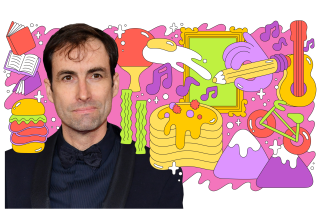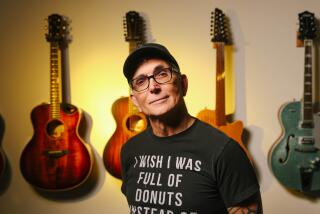Success Is Still a Surprise to Versatile Tommy Tune : Stage: Winner of nine Tony awards leads ‘Bye Bye Birdie’ traveling troupe into San Diego.
SAN DIEGO — After nine Tonys in four categories--for direction, choreography and performing--the only person still surprised by Tommy Tune’s success is Tune himself.
He always knew he wanted to dance. His parents, neither of whom are theater professionals, enjoyed ballroom dancing, and, ever since he can remember, he loved to tap his toes. He staged dance programs in his parents’ garage from the age of 5 (two years after his family moved from Wichita Falls, Tex., where he was born, to Houston). But theater? He never even saw a play until he was in high school. He only entered the drama department because his school didn’t have a dance department.
But when he saw his first play, “The Glass Menagerie,” at the Alley Theatre in Houston, he was hooked.
Decades later, his voice filled with awe as he talked of that experience in a phone interview from Chicago, where he was starring in the national tour of “Bye Bye Birdie” that comes to San Diego Monday. And his remembrance ran on breathlessly, without so much as a sentence break.
“The lights went down and became completely black, and there was this world and people were living in this world, and we laughed and we cried and it was a life-changing experience that it could happen not on a movie screen but in front of you, live,” he said.
“That was the genesis. And then I went to a community theater to see ‘The King and I,’ and it had the same impact as ‘Glass Menagerie’ except there was singing and dancing. And I said, ‘This is it.’ ”
Tune, who will star in the San Diego Playgoers presentation of “Bye Bye Birdie” at Copley Symphony Hall from Monday through April 25, claims he never expected to become a star.
“My dream was that I (would come) to New York to dance in the chorus of a
Broadway show,” he said. “Eventually I got a job in the chorus of a Broadway show, and that was a dream come true. I never replaced that dream. I had no idea the course my life would take.”
Much has happened in between getting a part in the chorus of “Baker Street” and his current national tour of “Bye Bye Birdie.”
Nineteen years ago, he picked up his first Tony, for best featured actor in a musical for “Seesaw.” Then came best choreography for “A Day in Hollywood/A Night in the Ukraine” in 1980. Best direction for “Nine” in 1982. Best choreography and best actor in a musical for “My One and Only” in 1983. Best choreography and best direction for “Grand Hotel in 1989. And best choreography and best direction for “The Will Rogers Follies” in 1991.
But, 27 years ago, he was just another chorus dancer who had a way of sticking out from the crowd.
Tune credits that to his height--6-foot, 6 1/2 inches.
“In my first audition I realized I was especially tall for a chorus dancer. I kind of stuck out, and then someone said, ‘He would be good doing that little part.’ When I got that little part, you could look me up in the program. A casting director saw me and flew me out to test me for “Hello, Dolly!” (He played Ambrose Kemper; in another piece of film trivia, Michael Crawford played Cornelius Hackl).
“Then I did a television series called “Dean Martin Presents the Gold Diggers.” Twiggy saw it and told Ken Russell, and when he was casting “The Boyfriend” film, he called me.
“Now I was more than a chorus boy and fell into a role in ‘Seesaw’ for which I won my first Tony.”
But height has also had its drawbacks. To those who have questioned him for taking on the lightweight role of Albert Peterson in “Bye Bye Birdie,” a very dated (if Tony-award winning) 1960 classic, he has retorted that he’s “not easy to cast.”
So, when he gets a part, such as that of the song-writing manager of rock idol Conrad Birdie, he likes to stick with it for a while.
But Tune says he doesn’t just settle for these parts. He genuinely likes what he calls “pure entertainment.”
“In these times--and these are hard times--to go into a theater for 2 1/2 hours and leave your troubles outside appeals to people. It’s lighthearted fun, it’s family entertainment, and I think I’ve learned a great deal about what an audience appreciates from ‘Birdie.’ It’s a complete escape.”
Also, as an entertainer, these kind of song and dance turns are what he feels he’s best at. He said he would never cast himself in a show as dark as “Grand Hotel.”
“As a performer I’m a light entertainer. As a director, I have to reveal something of my interior that has more meat than I have as a performer.”
Although this production of “Bye Bye Birdie” was directed by Gene Saks, Tune still has a way of being more than just a hired hand.
For example, it was Tune’s idea to add a song, “A Giant Step,” to the original musical.
In “Bye Bye Birdie,” Albert is totally dominated by his mother, who doesn’t want him to marry his love, Rosie. At the moment that he finally tells his mother to go home, Tune thought the show needed a song. Preferably one that calls for dancing, since the audience, Tune said simply, “likes to see me dance.”
But there wasn’t any such song in the score. So he went back to the source.
“I asked the original composing team (Lee Adams and Charles Strouse) to see if they would be amenable to a song there, and they said, ‘We can’t believe you’re asking this. We wanted to do that originally, but we ran out of time when we had to open the show.’ They must have been writing it subconsciously all those years though. Because they came back in a week with a song.”
For years, Tune has worked on a number of projects simultaneously. He was tired during this particular interview because, following the show the night before, he had directed the company in a benefit for AIDS victims one hour after “Bye Bye Birdie” closed. He’s been doing such shows in many cities, although no benefit was planned for San Diego at press time.
When the current tour closes June 7 in Boston, he flies to London to direct “Grand Hotel “ in the West End of London. Then he flies back to direct the national company of “The Will Rogers Follies,” which opens in San Francisco later this year. He also has other projects in the works, but won’t talk about them because, he said, “I’m very superstitious.”
But busy as he is, one thing hasn’t changed.
“I’m still putting on shows in the garage. It’s still about the game that I played as a child. There’s love and there’s work, and, when you can connect it up and love your work . . . well, I guess I’m pretty lucky.”
Performances of “Bye Bye Birdie” are at 8 p.m. Monday through April 25, with Wednesday and Saturday matinees at 2. Tickets are $26-$38.50. At Copley Symphony Hall, 7th Avenue and B Street, San Diego, 278-TIXS.
More to Read
The biggest entertainment stories
Get our big stories about Hollywood, film, television, music, arts, culture and more right in your inbox as soon as they publish.
You may occasionally receive promotional content from the Los Angeles Times.










